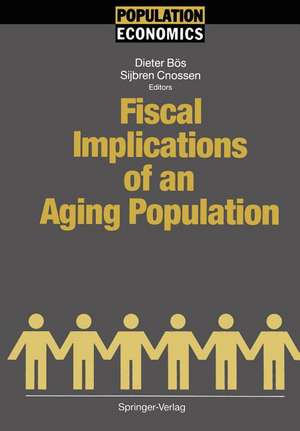Fiscal Implications of an Aging Population: Population Economics
Editat de Dieter Bös, Sijbren Cnossenen Limba Engleză Paperback – feb 2012
Din seria Population Economics
-
 Preț: 422.11 lei
Preț: 422.11 lei - 15%
 Preț: 647.59 lei
Preț: 647.59 lei - 18%
 Preț: 954.45 lei
Preț: 954.45 lei - 15%
 Preț: 641.71 lei
Preț: 641.71 lei - 18%
 Preț: 952.40 lei
Preț: 952.40 lei - 18%
 Preț: 950.03 lei
Preț: 950.03 lei -
 Preț: 395.85 lei
Preț: 395.85 lei - 15%
 Preț: 635.47 lei
Preț: 635.47 lei - 15%
 Preț: 649.39 lei
Preț: 649.39 lei -
 Preț: 384.31 lei
Preț: 384.31 lei - 15%
 Preț: 653.65 lei
Preț: 653.65 lei -
 Preț: 391.79 lei
Preț: 391.79 lei - 15%
 Preț: 641.85 lei
Preț: 641.85 lei - 15%
 Preț: 698.15 lei
Preț: 698.15 lei - 18%
 Preț: 785.24 lei
Preț: 785.24 lei - 18%
 Preț: 950.52 lei
Preț: 950.52 lei - 15%
 Preț: 637.59 lei
Preț: 637.59 lei
Preț: 637.59 lei
Preț vechi: 750.11 lei
-15% Nou
Puncte Express: 956
Preț estimativ în valută:
121.100€ • 127.38$ • 100.97£
121.100€ • 127.38$ • 100.97£
Carte tipărită la comandă
Livrare economică 04-18 aprilie
Preluare comenzi: 021 569.72.76
Specificații
ISBN-13: 9783642772528
ISBN-10: 3642772528
Pagini: 208
Ilustrații: XI, 191 p.
Dimensiuni: 170 x 244 x 11 mm
Greutate: 0.34 kg
Ediția:Softcover reprint of the original 1st ed. 1992
Editura: Springer Berlin, Heidelberg
Colecția Springer
Seria Population Economics
Locul publicării:Berlin, Heidelberg, Germany
ISBN-10: 3642772528
Pagini: 208
Ilustrații: XI, 191 p.
Dimensiuni: 170 x 244 x 11 mm
Greutate: 0.34 kg
Ediția:Softcover reprint of the original 1st ed. 1992
Editura: Springer Berlin, Heidelberg
Colecția Springer
Seria Population Economics
Locul publicării:Berlin, Heidelberg, Germany
Public țintă
ResearchCuprins
Social security in a general equilibrium model with endogenous government behavior.- The marginal cost of public funds with an aging population.- Optimal pension funding with demographic instability and endogenous returns on investment.- Pay-as-you-go social security in a changing environment.- Public pensions in transition.- Ageing and the labor market.- Tax reform, population ageing and the changing labour supply behaviour of married women.- United States public policy and the elderly.- Life cycle savings and consumption constraints.


















